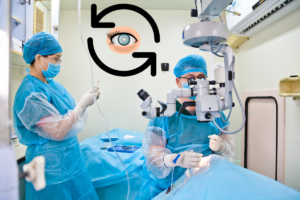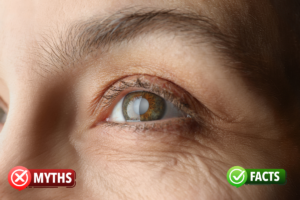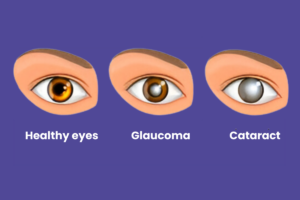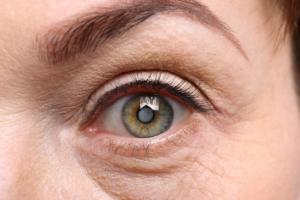What will happen if a cataract is left untreated?

Cataracts are one of the most common causes of vision impairment worldwide, especially in older adults. While cataract surgery is a routine procedure that can restore vision, many people may delay seeking treatment due to misconceptions, fear, or lack of awareness about the severity of untreated cataracts. In this blog, we will explore the potential consequences of leaving a cataract untreated, the risks involved, and why early intervention is crucial for maintaining eye health.
- Progressive vision impairment.
- Increased risk of falls and accidents.
- Development of secondary eye conditions.
- Complete vision loss (Blindness).
- Impact on mental health.
- Delayed recovery & treatment complications.
What is a cataract?
A cataract occurs when the natural lens of the eye, which is normally clear, becomes cloudy or opaque over time. This cloudiness obstructs light from passing through the lens, leading to blurred or reduced vision. Cataracts are most common in older adults, though they can also develop due to injury, certain medical conditions like diabetes, or prolonged use of medications such as steroids.
There are different stages of cataract development, from early, mild changes in the lens to advanced stages where vision is significantly affected. If left untreated, a cataract will gradually worsen and may eventually lead to complete blindness.
1. Progressive vision impairment

The most noticeable consequence of an untreated cataract is the gradual deterioration of vision. Early stages of cataracts might cause slight blurriness or a decrease in contrast, but these symptoms can often go unnoticed. As the cataract progresses, the cloudiness of the lens becomes more pronounced, leading to:
- Blurred vision: The most common symptom of cataracts is blurred or cloudy vision. As the lens becomes increasingly opaque, it becomes harder to focus on objects, especially in low-light conditions.
- Sensitivity to light: Cataracts cause light to scatter, making it difficult to see in bright environments. This can be especially dangerous when driving, as glare from headlights and streetlights can severely impact vision.
- Double vision: In some cases, untreated cataracts can lead to double vision in one eye, making everyday tasks, such as reading or watching television, challenging.
- Difficulty with night vision: Cataracts can impair vision in low-light situations, making it harder to see at night or in dimly lit rooms.
2. Increased risk of falls and accidents

As cataracts worsen, the inability to see clearly puts individuals at a higher risk of accidents, particularly falls. Poor vision can lead to difficulty navigating stairs, uneven surfaces, or unfamiliar environments. Older adults, who are already at risk for falls, may experience serious injuries, including fractures or head trauma, if their cataracts are not treated. This is why cataracts are a significant concern for the elderly population.
- Impaired depth perception: Cataracts affect how we judge distances, making it difficult to accurately assess the space between objects. This can lead to accidental bumping into furniture or tripping over obstacles.
- Balance issues: Poor vision can cause problems with balance and coordination, increasing the likelihood of falls and related injuries.
3. Development of secondary eye conditions

Untreated cataracts can lead to the development of other eye conditions that can further compromise vision. Some of the most common conditions associated with untreated cataracts include:
- Glaucoma: In some cases, the buildup of pressure in the eye due to cataracts can lead to glaucoma, a condition that can damage the optic nerve and cause permanent vision loss if not treated. Glaucoma is more common in individuals with advanced cataracts, as the cataract-induced lens changes can obstruct fluid drainage within the eye.
- Retinal changes: The clouding of the lens can also affect the retina, leading to changes in the way the eye perceives light and color. As the cataract grows, it may further obstruct vision, leading to complications such as macular edema or retinal detachment.
- Increased risk of eye infections: A cloudy lens can also make the eye more vulnerable to infections. The body’s natural defenses may not function as effectively, leading to potential complications that could require more intensive treatments.
4. Complete vision loss (Blindness)

In rare cases, untreated cataracts can lead to total blindness. While cataract surgery is highly effective in restoring vision, once blindness sets in, it may be too late to reverse the damage.
For a deeper understanding of the potential consequences of untreated cataracts, including blindness, please visit our blog post: Can cataracts cause blindness?
5. Impact on mental health

The gradual decline in vision caused by untreated cataracts can have significant effects on a person’s mental health. The inability to see clearly and maintain independence can lead to feelings of frustration, isolation, and depression. As vision worsens, individuals may become increasingly dependent on others for tasks they once did independently, such as reading, cooking, or driving.
- Depression & Anxiety: The loss of vision can be distressing, and many people experience depression or anxiety as a result. The fear of becoming completely blind can also contribute to psychological distress.
- Reduced quality of life: As cataracts progress, individuals may find it harder to engage in social activities, maintain relationships, or participate in hobbies they once enjoyed. The isolation caused by poor vision can take a toll on emotional well-being.
6. Delayed recovery & treatment complications

When cataracts are left untreated for too long, the surgical process becomes more complicated. In advanced cases, the lens may become harder or more calcified, which can make cataract surgery more challenging for the surgeon. Delaying treatment also increases the risk of complications during surgery, as well as a longer recovery time after the procedure.
- Increased surgical risk: The more advanced the cataract, the more difficult it may be for a surgeon to remove it successfully. This could potentially lead to longer surgery times or a higher likelihood of complications.
- Longer recovery: As cataracts worsen, surgery may require a longer recovery period. In some cases, the recovery process may involve additional treatments or a more intensive post-operative care regimen.
Conclusion
The consequences of leaving a cataract untreated are severe and can impact various aspects of life, from vision to mental health. Early detection and treatment are critical to preventing complications and maintaining a good quality of life. Cataract surgery is a simple and highly effective procedure that can restore vision, improve safety, and enhance overall well-being.
If you or a loved one is experiencing symptoms of cataracts, such as blurry vision, sensitivity to light, or difficulty seeing at night, it’s essential to consult with an eye care professional. The sooner cataracts are treated, the better the outcome will be, ensuring that vision remains clear and life continues without the limitations caused by untreated cataracts.
At Krisha Eye Hospital, we specialize in cataract surgery and offer personalized treatment options to ensure the best possible results for our patients. If you are concerned about cataracts, don’t wait – schedule an eye exam with us today.
Author bio
Dr. Dhwani Maheshwari, an esteemed ophthalmologist with over 10 years of experience, leads Krisha Eye hospital in Ahmedabad with a commitment to advanced, patient-centered eye care. Specializing in cataract and refractive surgery, Dr. Maheshwari has performed more than a thousand successful surgeries. Her expertise lies in phacoemulsification, a technique recognized for its precision in cataract treatment.
Dr. Maheshwari’s educational journey includes an MBBS from Smt. NHL MMC, a DOMS from M & J Institute of Ophthalmology, and a DNB in Ophthalmology from Mahatme Eye Bank Eye Hospital, Nagpur. She also completed a fellowship in phacoemulsification at Porecha Blindness Trust Hospital, further enhancing her surgical skills. In addition to her work at Krisha Eye Hospital, Dr. Maheshwari serves as a consultant ophthalmologist at Northstar Diagnostic Centre.
Under her leadership, Krisha Eye Hospital aims to bring all superspecialties under one roof, offering comprehensive eye care solutions for all vision needs.
FAQs
The timeline for cataracts varies from person to person. While some people may experience gradual changes in their vision for years before seeking treatment, others may find that their cataracts progress rapidly. It’s important to monitor your vision regularly and seek professional advice when you notice symptoms like blurry vision, glare sensitivity, or difficulty seeing in low light. Early intervention is crucial to prevent severe vision loss.
While cataracts are a natural part of aging, certain lifestyle changes can help delay their development. These include protecting your eyes from UV radiation by wearing sunglasses, maintaining a healthy diet rich in antioxidants, controlling underlying health conditions such as diabetes, and avoiding smoking. Regular eye checkups can also help detect cataracts in their early stages, allowing for timely intervention.
Yes, cataract surgery can still be performed on advanced cataracts, though it may be more challenging. In some cases, the lens may be more difficult to remove or may require additional steps during surgery. The success rate of cataract surgery remains high, even in advanced stages, but early intervention is preferred for the best outcome and a quicker recovery.
While cataract surgery can dramatically improve vision, it may not always restore 20/20 vision. The outcome depends on various factors, including the overall health of the eye and the presence of other conditions, such as macular degeneration. However, most patients experience significantly improved vision and a better quality of life after the surgery.
Yes, cataract surgery can usually be performed even if you have other eye conditions such as glaucoma or macular degeneration. Your eye doctor will assess your overall eye health and determine the best approach for your individual needs. It’s important to inform your surgeon about any pre-existing eye conditions to ensure the most appropriate treatment plan.
































